Fire Fighting (6 Week)
Firefighting training is primarily focused on preparing individuals to respond to and combat fires effectively and safely.
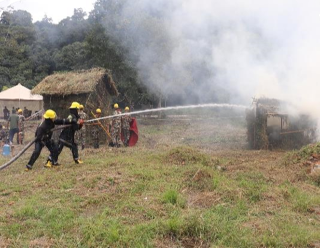
Medical First Responder & Collapsed Structure and Search and Rescue (5/6 Weeks)

Similarly, medical first responder training prepares individuals to provide immediate and basic medical care in emergency situations. Medical first responders are often the first healthcare providers to arrive at the scene of an emergency, and their training is designed to address critical aspects of pre-hospital care.
On the other hand, collapsed structure search and rescue (CSSR) training is designed to prepare responders to locate effectively and safely, access, stabilize, and extricate individuals who may be trapped or injured in structures that have collapsed due to disasters such as earthquakes, bombings, or other emergencies. This specialized training is crucial for urban search and rescue teams, firefighters, emergency medical personnel, and other first responders.
Swift Water Search and Rescue (6 Weeks)
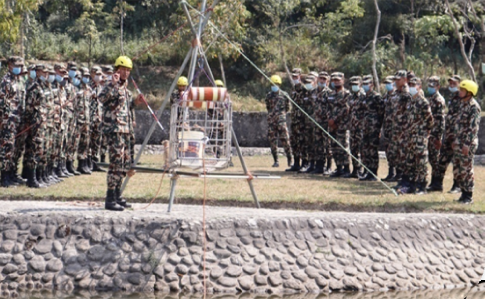
In order to prepare responders to conduct rescue operations effectively and safely in swift water environments, Swift Water Search and Rescue (SWSR) training is conducted.
Basic Scuba Diving (7 weeks)
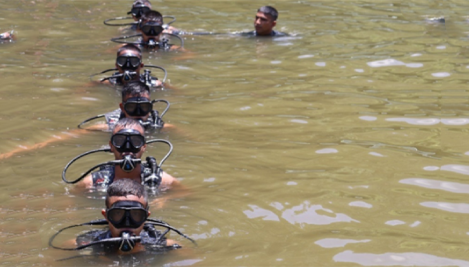
Scuba diving involves breathing underwater using a self-contained underwater breathing apparatus (scuba), and proper training is essential to ensure the safety of divers and minimize the risks associated with this underwater activity. Hence, basic scuba diving training is designed to provide individuals with the knowledge, skills, and confidence to safely engage in deep water rescue operations.
Air Rescue (4 weeks)
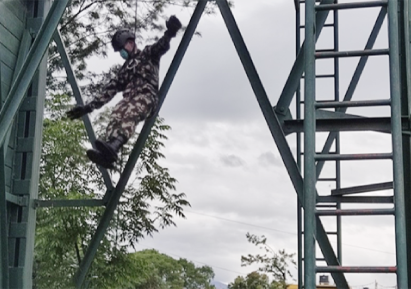
Similarly, Air Rescue/High Angle and High-Altitude Search and Rescue training is designed to prepare responders for specialized rescue operations in challenging environments, particularly those involving vertical or high-altitude scenarios. The primary objective of this training is to equip personnel with the knowledge, skills, and techniques required to conduct safe and effective rescues in high-angle and high-altitude settings.
Tactical Level Search and Rescue ( 6 weeks)
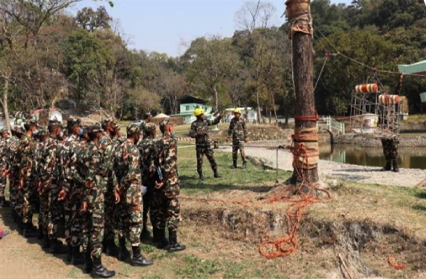
The primary goal of Tactical Level Search and Rescue training is to enable responders to conduct effective, coordinated, and safe search and rescue operations in challenging and dynamic environments. This training is often tailored for specialized teams, such as urban search and rescue (USAR) teams or tactical rescue teams, and emphasizes a combination of search techniques, tactical approaches, and operational coordination.
FE basic Course (6 weeks)

The field engineering basic course is aimed at giving basic field engineering techniques to all arms. When resources are scarce, these approaches will come in handy. It encourages improvisation.
Camp Coordination and Camp Management (CCMC)
The primary objective of Camp Coordination and Camp Management (CCCM) training is to train personal for the effective and efficient management of camps and settlements for displaced populations during humanitarian emergencies. CCCM is a critical component of humanitarian response efforts, especially in situations such as conflict, natural disasters, or other crises where large numbers of people are forced to seek refuge in temporary shelters.
Tree Trimming & Disaster Equipment Refresher Training (1 Week)

Properly trimmed trees are less likely to pose hazards such as falling branches or trees, reducing the risk of accidents and property damage. In order to ensure the safety and well-being of both operator and the public while trimming trees in times of disaster, Tree Trimming and Safety Training is conducted. tree trimming and safety training contribute to a safer and more sustainable approach to trimming trees.
In order to address cable car (gondola) emergencies, the national disaster management school has undertaken gondola emergency rescue training and exercises in the recent past.

In addition to providing disaster management training to military personnel at the operational level, we also conduct disaster management classes to junior and mid-level officers as well.
Capacity building initiatives
The National Disaster Management School has been providing capacity building trainings to Nepali Police with the aim of improving coordination and collaboration amongst other security authorities. In the very outset, Armed Police Forces of Nepal were also trained under Nepali Army’s umbrella particularly in this area.

